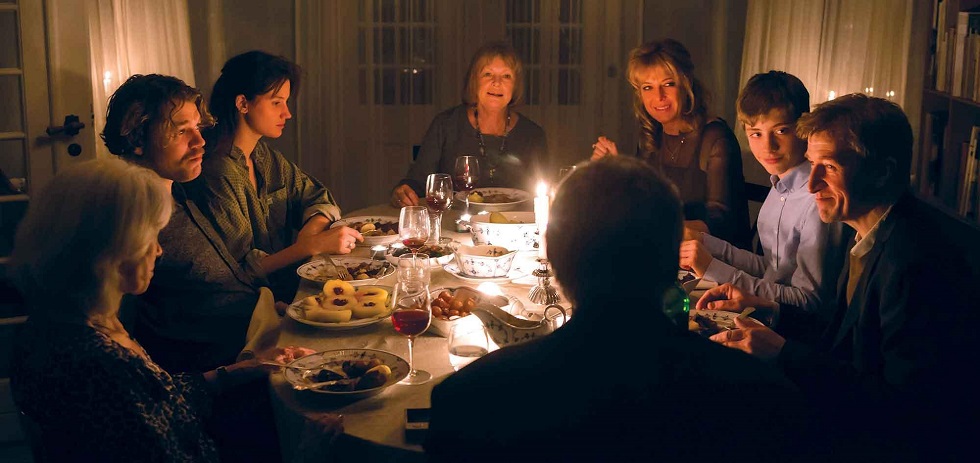To say that Silent Heart recalls the seminal Dogme 95 cult film Festen would be an understatement worthy of both films’ similarly muted Danish middle-class backdrops. In truth, this film, the latest from stalwart director Bille August and the 2014 Bodil Award for Best Danish Film winner, feels like an all but explicit retelling of the stormy 1998 no-fi drama, and contributes to a national cinema still profoundly influenced by the subversive chamber films of Trier, Vinterberg et al. It shares the central conceit of an extended family returning to the parents’ home for a tense yet momentous occasion, much of the focus on intense handheld camerawork, and even recasts one of the lead actresses in a similar role fifteen years down the line. Avoiding most of the clichés of the family ensemble piece, though, and borne by moving, pained performances by its veteran leads, Silent Heart explores well-worn issues with some incisiveness of its own. While its style would never be as radical as that of the inevitably-compared Festen, its emotional apexes are if anything more personal and profound.
Substituting the torrid sexual abuse revelations of Festen for a plot focusing instead on euthanasia is an early omen of Silent Heart’s studied maturity – what’s more impressive, though, is how August appears determined to use this basis as the springboard for an exploration of familial dysfunction. Elderly former doctor Poul (Danish screen legend Morten Grunwald, in a performance not unlike Victor Sjöström’s in Wild Strawberries) and his AMS-stricken wife Esther (Ghita Nørby) are the true ‘silent heart’ of the film’s family, recalling their two daughters, their partners, and lone grandchild to their semi-rural estate for a weekend away. We begin to sense that something’s amiss, though, when the elder daughter Heidi seems embarrassed by the salt-and-pepper shakers she brings her parents as a gift. “What do you bring to a gathering like this?”, she wonders aloud. That Heidi, a staid and neurotic wife and mother, is played by Paprika Steen, the actress who won numerous awards for her role in Festen as the wayward, rambunctious daughter who goads her family with a black boyfriend, is a nod to the evolution this film marks from the Dogme movement’s anti-establishment malaise, toward a calmer mode of reflection on the vagaries of northern European society. In this case, the shakers are an absurd gift – the family is gathering to spend a last weekend with Esther, at the end of which she and Poul will collude to end her life before she is rendered immobile and incapable.
Throughout the film, the ethics of euthanasia are introduced as they truthfully would be in such a scenario – clouded by characters’ emotional commitment to their mother and friend, and by their own personalities and quirks. “I totally understand you,” slovenly in-law Dennis (Pilou Asbæk) tells Esther – but it’s through a cloud of pot smoke, Dennis’ own means of dealing with mortality. His girlfriend, the other daughter Sanne (Danica Curcic), is the least convinced of Esther‘s decision, plainly because her own mental issues make her need a mother in her life more than the others. The entirety of the euthanasia plan is introduced in an unusually clumsy piece of exposition by Dennis, startlingly early in the film; there were still ninety minutes to run when I glanced at the duration. The danger that this decision would dissipate the mystery surrounding the nature of the family’s terse getaway, though, is mitigated, as August, the plot’s central question out of the way, instead resolves to let the characters work themselves into frenzies of their own, spurred by their messy relationships and half-buried mixed feelings about Esther’s illness. It’s a brilliant decision, and one which is aided by pallid but still captivating photography of the frosty house and its surroundings. Time is spent watching Poul collect firewood and Dennis kick a soccer ball around with Heidi’s son, moments which, while never laboured, communicate the simple joys of physicality and human contact which Esther will soon lose should she remain alive.
Silent Heart does occasionally lapse into melodramatic plotting which misses its intended seriousness. A late revelation that the couple’s old friend Lisbeth (Vigga Bro) is in truth becoming Poul’s romantic companion – at the urging of Esther – is whipped up into a series of angry miscommunications like in any tepid rom-com, in scenes which seem measured to mimic a true dramatic climax which simply doesn’t need to exist. Similarly, while his plot role is important, the constant reappearance of Dennis at the edge of frame skinning up a joint does become tiresome, a weak attempt at a reminder that the family does possess the inverted-comma drama it wishes to avoid. These quibbles do little to dampen the film’s absorbing atmosphere, though, and working through its characters’ foibles toward the inevitable climax is an appropriately draining experience. As if to rebut the typical ideas about cold, serious Scandinavia, though, it’s also a rewarding and moving one.

